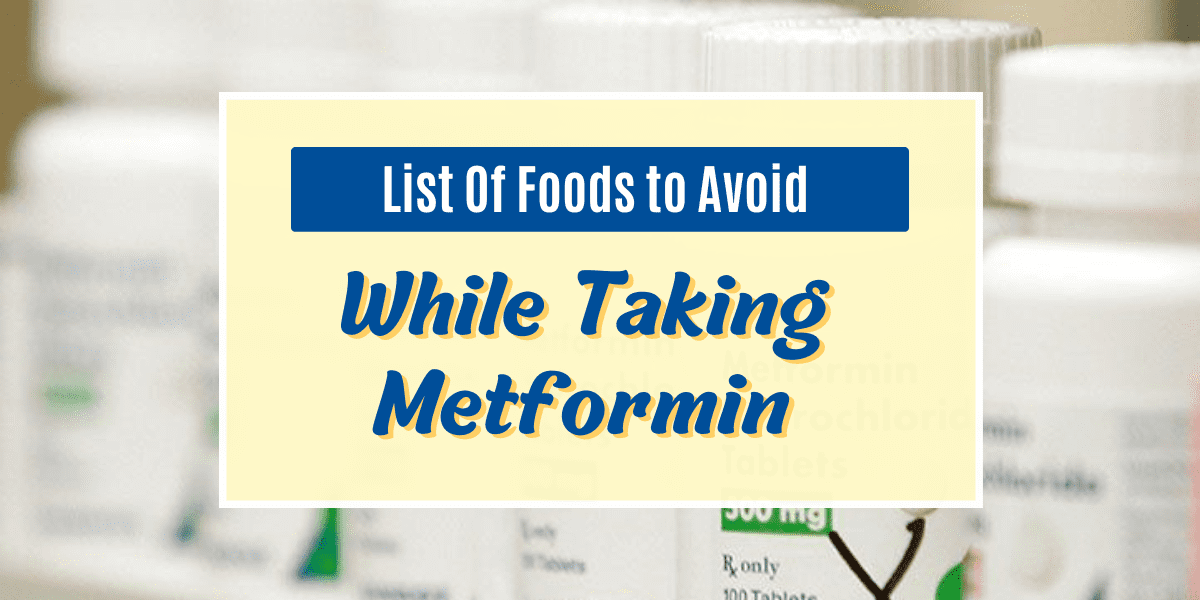
Metformin is a medication used to treat type 2 diabetes. While taking metformin, there are some foods you should avoid. These include high-carbohydrate foods and sugary drinks. Eating these foods can cause blood sugar to spike and make it difficult to control your diabetes. There are also other foods that you should eat while taking metformin for the best results.
Read on to learn more about what to avoid and eat while taking this medication.
Bad Foods When Taking Metformin
While not many particular foods interact with metformin, alcohol and several nutrients may reduce the effectiveness of the medication’s ability to treat diabetes.
Alcohol
One of the most important things that people who take metformin need to be aware of is the potential for interactions with other medications and substances. Alcohol is one of the substances that can interact with metformin. When alcohol and metformin are taken together, they can cause an increase in the level of metformin in the blood. This can lead to serious side effects, such as low blood sugar, lactic acidosis, and kidney damage.

High fiber foods
Some side effects are associated with metformin, including gastrointestinal distress and lactic acidosis. To minimize the risk of these side effects, avoiding high-fiber foods while taking metformin is vital. Foods that are high in fiber can cause digestive issues and may also interfere with the absorption of the medication. As a result, patients taking metformin should focus on eating low-fiber foods such as lean meats, cooked vegetables, and fruits that have been peeled or seeded. By following this diet, patients can help to ensure that metformin is effective and minimize the risk of side effects.
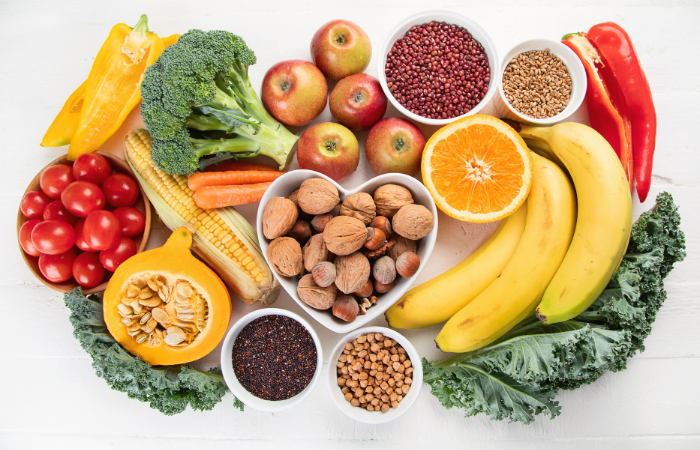
Simple and refined carbs
Some side effects of metformin are diarrhea, nausea, and vomiting. To help minimize these side effects, it is recommended that people taking metformin avoid simple and refined carbs. Simple carbs are found in foods like candy, cake, and cookies. They are also often added to processed foods, such as bread and cereal. Refined carbs are found in foods stripped of fiber and nutrients, such as white rice and white flour.

Sodium
Sodium contributes to dehydration, which can worsen lactic acidosis symptoms. Lactic acidosis can be severe and even life-threatening. Therefore, it is important for people taking metformin to avoid foods high in sodium. Foods high in sodium include canned soups, processed meats, and pickled vegetables.

Saturated Fats
Saturated fats are fat in animal products such as butter, cheese, and red meat. They are also sometimes found in processed foods such as cookies and crackers. Eating too much-saturated fat can lead to other health problems such as heart disease and obesity. Therefore, limiting your intake of saturated fats is best, especially if you are taking metformin.
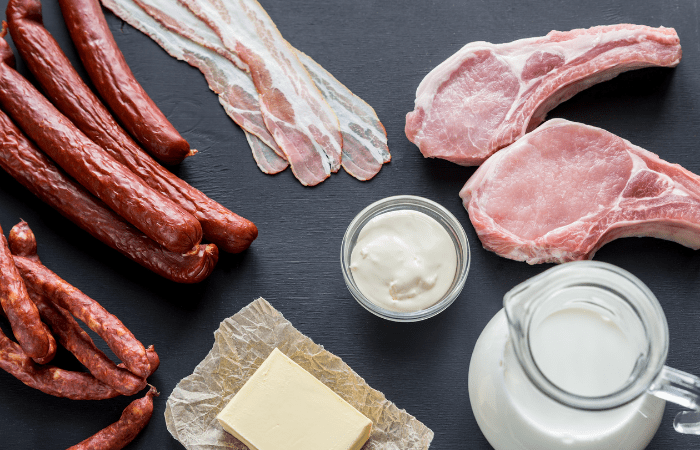
Grapefruit
Grapefruit inhibits an enzyme in the gut that metabolizes metformin, leading to higher drug levels in the bloodstream. This can cause serious side effects, including low blood sugar, gastrointestinal issues, and lactic acidosis (a build-up of lactate in the blood). So, if you’re taking metformin, steer clear of grapefruit—and check with your doctor before eating any other new foods.

Bad Foods When Taking Metformin for PCOS
One of the most common treatments for PCOS is the medication metformin. Metformin helps to regulate insulin levels, which can, in turn, help to regulate hormones and reduce symptoms like excess hair growth and irregular periods.
Fried foods
Fried foods are high in fat and can worsen gastrointestinal symptoms. In addition, fried foods are often high in simple carbohydrates, which can cause blood sugar levels to spike. Maintaining stable blood sugar levels for people with PCOS is essential for managing symptoms. Therefore, avoiding fried foods is integral to keeping symptoms under control.
Refined grains
When insulin levels are high, it can trigger an increase in testosterone, leading to PCOS symptoms. In addition, refined grains are a significant source of sugar, and eating too many can raise your insulin levels. Aim for complex carbs like whole grains, fruits, and vegetables to get the most out of your treatment. These foods are rich in nutrients and fiber, which help to regulate blood sugar levels and prevent spikes in insulin.
Foods with added sugar
High blood sugar levels can trigger the body to produce more testosterone, leading to PCOS symptoms such as irregular periods, acne, and weight gain. In addition, foods with added sugar can cause spikes in blood sugar levels, offset the effects of metformin and potentially worsen PCOS symptoms.
Alcohol
Alcohol can interfere with the way metformin works. When taken together, alcohol and metformin can cause an increase in blood sugar levels. This can lead to headaches, dizziness, and nausea. In extreme cases, it can cause low blood sugar levels, which can be dangerous.
Sugary drinks
Sugary drinks can exacerbate metformin’s side effects by increasing the sugar in your blood. This can lead to increased hunger, cravings, and fatigue. To stay healthy and avoid side effects, be sure to avoid sugary drinks while taking metformin for PCOS.

Other Things to Avoid When You Are Taking Metformin
When using Metformin, taking a small number of medications may increase the risk of lactic acidosis. Therefore, if a person is consuming any of these medications, it is crucial to address this with the appropriate doctor:
- anticonvulsants like topiramate, zonisamide
- oral contraceptives
- Diuretics like acetazolamide
- corticosteroids like prednisone
- antihypertensives such as amlodipine
- antipsychotic drugs, including chlorpromazine
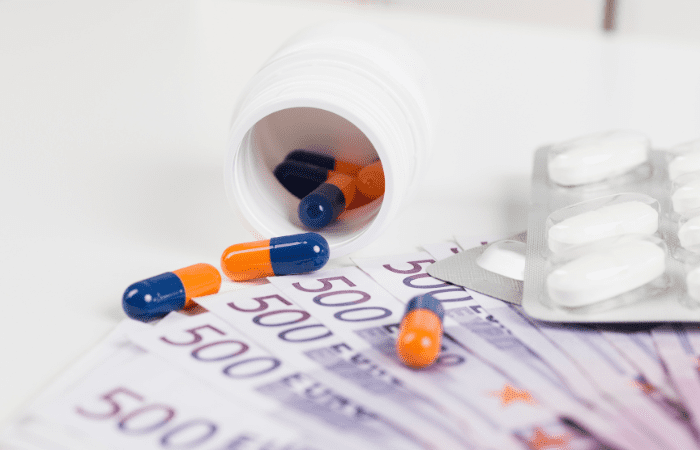
Good Foods When Taking Metformin
Some meals can promote blood glucose management in addition to metformin use.
Lean protein
A few reasons lean protein foods are worth considering when taking metformin. First, lean protein helps to stabilize blood sugar levels. This is important for people with diabetes, as stable blood sugar levels can help to prevent serious complications. In addition, lean protein helps to promote a feeling of fullness, which can help to control portion sizes and to avoid overeating. Finally, lean protein is an excellent source of nutrients, including vitamin B12, iron, and zinc.
These nutrients are essential for good health and can be challenging to get from other sources. For all these reasons, lean protein foods are an excellent choice for people taking metformin.
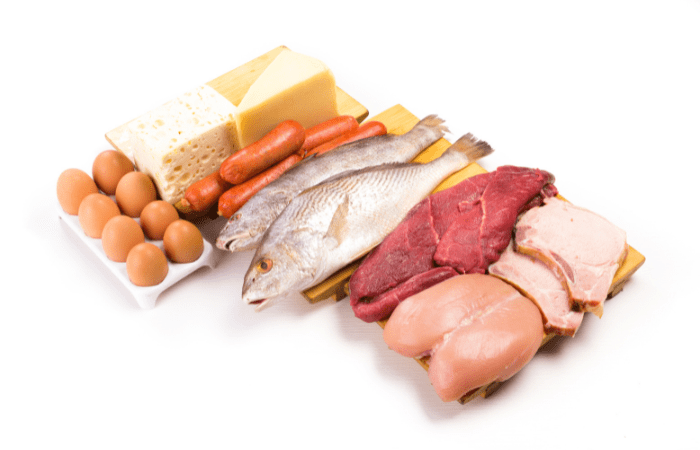
Moderate fiber intake
Fiber helps to bulk up stool and can make diarrhea less severe. In addition, fiber is prebiotic, meaning that it helps to promote the growth of healthy gut bacteria. These bacteria are essential for maintaining a healthy digestive system.
Therefore, moderate intake of fiber-rich foods is an important part of managing metformin-related diarrhea. Foods high in fiber include beans, lentils, whole grains, and fruits and vegetables. Including these foods in your diet can help you stay healthy and hydrated while taking metformin.

Nonstarchy vegetables
Nonstarchy vegetables are a good choice because they are low in calories and carbohydrates. They also contain fiber, which helps slow down sugar absorption into the bloodstream. In addition, nonstarchy vegetables are a good source of vitamins and minerals.

Complex carbohydrates
Complex carbohydrates are slowly broken down and absorbed into the bloodstream, which can help to prevent gastrointestinal upset. Additionally, complex carbohydrates help stabilize blood sugar levels, which can benefit people with diabetes. As always, it is important to speak with a doctor or registered dietitian before making any changes to your diet.
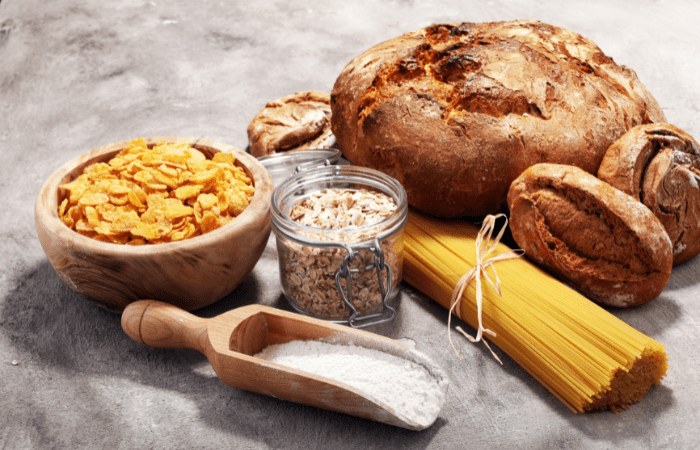
Healthy fats
When it comes to healthy fats, there are certain types of food you should consider. One type is fish, such as salmon and tuna. Salmon is packed with omega-3 fatty acids, which have improved insulin resistance. Tuna also contains omega-3 fatty acids, as well as taurine, an amino acid that has been linked to improved blood sugar levels.
Another type of food to consider is nuts. Almonds, in particular, are a good choice because they contain magnesium, a mineral that helps to regulate blood sugar levels. Walnuts are also a good option, as they contain alpha-linolenic acid, an omega-3 fatty acid that has been shown to improve insulin sensitivity.
Finally, avocados are a great source of healthy fats. They contain monounsaturated fats linked to improved blood sugar control. So if you’re taking metformin, include these healthy fats in your diet.

What is Metformin?
Metformin is a medication that is used to treat Type 2 diabetes. It works by reducing the amount of sugar your liver produces and making your body more sensitive to insulin.
How do I take metformin?
Metformin is usually taken two or three times a day with meals. You should start with a low dose and gradually increase it as your body gets used to the medication.
How much metformin to take?
The amount of metformin you should take depends on a few factors, including age, kidney function, and why you are taking metformin. Your doctor will start you off on a low dose and then increase it gradually over time as needed. You must follow your doctor’s instructions carefully and not increase or decrease your dosage without talking to them first.
How Does Metformin Work?
It works by lowering the amount of sugar produced by the liver and increasing the sensitivity of cells to insulin. In addition, metformin can also help to reduce the risk of developing complications such as heart disease and stroke. The precise mechanism by which metformin works are not fully understood, but it is thought to involve multiple different mechanisms. As a result, metformin is an effective treatment for type 2 diabetes and can help to improve overall health.
Are there any side effects of metformin?
The most common side effects of metformin are nausea, vomiting, diarrhea, gas, and stomach pain. You should speak to your doctor if you experience any of these side effects. Some other less common side effects include headache, tiredness, and skin rashes.
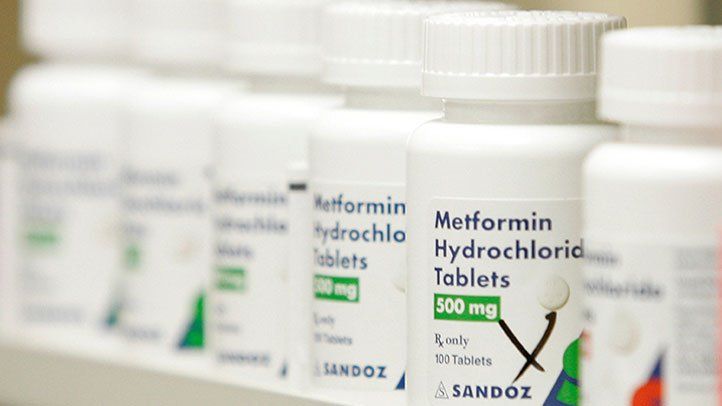
Can You Take Metformin With Food?
If you take metformin with food, it is important to ensure that you eat a healthy diet. Eating a diet that is high in nutrients and low in empty calories will help to keep your blood sugar levels stable. In addition, foods that are high in fiber and protein can help slow down sugar absorption into your bloodstream, which can help to prevent spikes in blood sugar levels.
Some people may find that they have more energy when they take metformin with food. This is because metformin can help the body use insulin better, and when it is used efficiently, it can give you more energy. If you have more energy when you take metformin with food, use this extra energy wisely by getting up and moving around for at least 30 minutes each day. Doing so will help you to keep your blood sugar levels under control.

The Precautions and Risks
According to the Mayo Clinic, over 29 million people in the United States have diabetes. Of those 29 million, approximately 90 to 95 percent have type 2 diabetes. Metformin is a medication used to help control blood sugar in adults with type 2 diabetes. It is not used to treat type 1 diabetes. While metformin can be an effective medication, it is not without risks.
As with any medication, some risks and side effects are associated with taking metformin. Some of the more common side effects include:
- Headache
- Dizziness
- Weakness or fatigue
- Diarrhea or upset stomach
- Gas or bloating
- Heartburn
Metformin may also cause a condition called lactic acidosis. Lactic acidosis is a build-up of lactic acid in the bloodstream. Symptoms of lactic acidosis include:
- Nausea or vomiting
- Abdominal pain
- Muscle pain
- Shortness of breath
- Excessive sleepiness
- Weakness or irregular heartbeat

If you experience these symptoms, you should contact your doctor immediately, as lactic acidosis can be fatal. Some other precautions and risks to be aware of when taking metformin include:
- Do not take metformin if you have kidney problems.
- Do not take metformin if you are going into surgery.
- Tell your doctor if you are pregnant, planning to become pregnant, or breastfeeding, as metformin may not suit you.
When to See a Doctor?
You should take metformin exactly as prescribed by your doctor. Your doctor may occasionally change your dose. Taking metformin with meals helps reduce stomach or bowel side effects that may occur during treatment. Do not crush, chew, or break an extended-release tablet or tablet. Swallow it whole. Breaking the pill could cause too much of the drug to be released at one time.
Call your doctor right away if you have any of these serious side effects:
• chest pain or heavy feeling, pain spreading to the jaw or shoulder, nausea, sweating;
• sudden dizziness or fainting; pain or burning when you urinate;
• enlarged breasts (in men); jaundice (yellowing of skin or eyes);
• swelling in your ankles or legs; trouble breathing; change in the amount of urine produced
If you have any of these less serious side effects, call your doctor:
• headache; mild diarrhea; upset stomach; minor skin rash; stuffy nose
These are not all the possible side effects of metformin. If you have any questions about metformin or experience any severe side effects, be sure to call your doctor right away!

How to Lessen the Side Effects of Metformin?
Start with a low dose and increase gradually.
When starting metformin, your doctor will likely prescribe a low dose and increase it gradually over time. Taking a smaller dose at first can help your body get used to the medication and lessen the chances of experiencing side effects. If you experience side effects, they should be mild and go away after a few days.
Take metformin with food.
Taking metformin on an empty stomach makes you more likely to experience nausea and vomiting. To help lessen these side effects, take metformin with food or after a meal. You can also try dividing your dose into two smaller doses taken throughout the day.
Drink plenty of fluids
Dehydration is a common side effect of metformin, so it’s essential to drink plenty of fluids while taking the medication. Aim for eight glasses of water per day or more if you’re sweating excessively or have diarrhea. You may also want to avoid alcohol, which can contribute to dehydration.
Consider taking an extended-release formulation.
Extended-release metformin is designed to release slowly into your body over time, which can help reduce the chances of gastrointestinal side effects such as nausea and diarrhea. If you’re struggling with gastrointestinal side effects from regular metformin, talk to your doctor about whether extended-release metformin would be a good option.

Final Thoughts
If you have been diagnosed with type 2 diabetes, your doctor may prescribe metformin. This medication can help you control your blood sugar levels, but there are some foods you should avoid while taking it. High-carbohydrate foods and sugary drinks can cause your blood sugar to spike, so it’s best to avoid them. Other foods can help you control your diabetes while taking metformin. Be sure to talk to your doctor about what foods are best for you. If you have any questions or experience any severe side effects, be sure to call your doctor right away!
Frequently Asked Questions (FAQs)
What diet should I follow while taking metformin?
Prepare entire foods, including grains, fruits, and vegetables. Limit the number of processed meals you eat. Eat a low-carb, low-fat, high-protein diet. Control your portion sizes.
What is the best time of day to take metformin?
For a lower risk of side effects, taking metformin pills with or just after your evening meal is preferable. Take your metformin pills whole with a glass of water.
How can you tell metformin is working?
A doctor can do the following tests to assess how metformin impacts your health: Your insulin, HbA1C, and glucose levels are in a range that can all be checked by blood testing. If their levels are in range, the drug is functioning.
Does metformin make you tired?
If you use metformin for an extended period, it may result in a vitamin B12 deficit. This might cause you to feel exhausted, short of breath, and dizzy. Therefore your doctor may examine your vitamin B12 levels.




